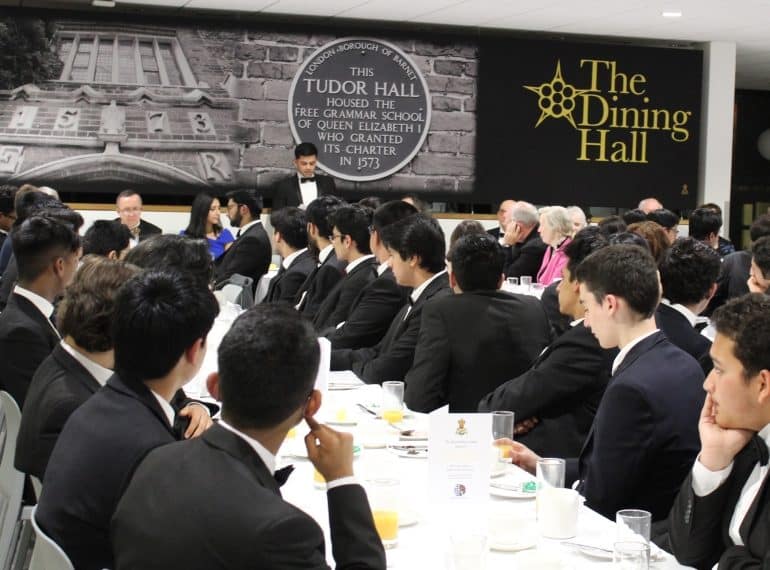
Sixth-formers took on Old Elizabethan opposition to debate one of the biggest questions of our era – whether there is a future for democracy.
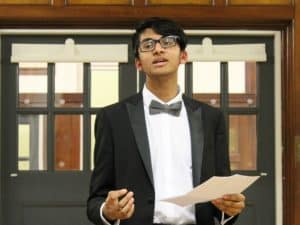 More than 170 guests, including Old Elizabethans, Year 12 pupils and staff, attended the 54th Elizabethan Union Annual Dinner Debate. The debate is a formal event which helps sixth-formers prepare for similar occasions at university and, later, in their professional lives.
More than 170 guests, including Old Elizabethans, Year 12 pupils and staff, attended the 54th Elizabethan Union Annual Dinner Debate. The debate is a formal event which helps sixth-formers prepare for similar occasions at university and, later, in their professional lives.
At the start of the evening, an indicative vote on the motion, This House believes democracy has had its day, revealed that a large majority – around an 80:20 split – opposed it. However, the School team successfully shook the faith in democracy of some 15-20 people, who had swung to their side of the argument by the final vote, thus technically giving the School victory in the debate. Nevertheless, a majority – albeit now reduced to 70:30 – remained opposed to the motion.
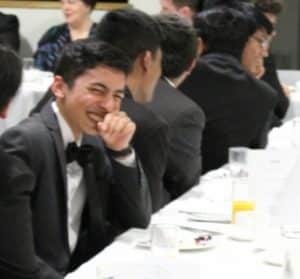 Headmaster Neil Enright said: “This was an enjoyable occasion, with some adroitly made arguments on both sides and contributions in the floor debate that were both enthusiastic and well-considered. I am grateful to the visiting alumni, including our guest speaker, Nikhil Patel.”
Headmaster Neil Enright said: “This was an enjoyable occasion, with some adroitly made arguments on both sides and contributions in the floor debate that were both enthusiastic and well-considered. I am grateful to the visiting alumni, including our guest speaker, Nikhil Patel.”
The School team of Chris Hall and Aryan Jain explained that democracy was failing to solve the big questions and, furthermore, was wrongly identifying what those big questions were. They gave as examples the fact that large amounts of effort were being spent in the UK on Europe and Brexit, but correspondingly less on issues such as climate change, education and welfare. The pair argued that 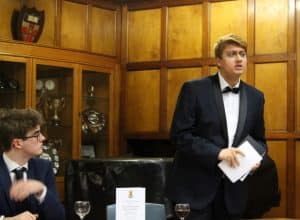 the electorate’s greatest concerns were not always based upon real evidence – a problem they blamed on media distortion.
the electorate’s greatest concerns were not always based upon real evidence – a problem they blamed on media distortion.
Instead they put forward a form of technocratic government under which the experts could get on with running the country and implementing the right policies, noting that we already entrust large and important sections of government, such as the legal system, to independent non-elected institutions – in this case, the judiciary.
“It was perhaps an idealised vision of how such a government might operate, but Chris Hall grounded it all strongly in logic,” said the Headmaster.
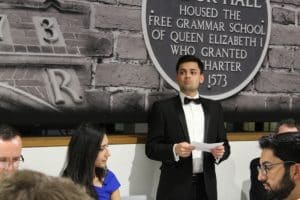 The motion was opposed by Ashwin Sharma (OE 2008–2015) and by Year 12 boy Alex Beard (replacing old boy Jason Thomas [OE 2010–2015], who was unable to attend).
The motion was opposed by Ashwin Sharma (OE 2008–2015) and by Year 12 boy Alex Beard (replacing old boy Jason Thomas [OE 2010–2015], who was unable to attend).
“Ashwin and Alex worked very well together to argue a compelling case, with Alex stepping in very well to complete the opposition and contributing significantly to the very high standard of debating across all the speakers,” said the Headmaster.
They argued that democracy is the best system we have. Moreover, the rise of the internet and other new technologies are increasing democratic opportunities around the world, including in 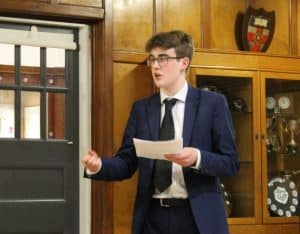 countries not typically classed as democracies. Democracy is more than just elections, they pointed out, stating that the very fact that the Elizabethan Union Dinner Debate was taking place was itself evidence of a functioning democracy.
countries not typically classed as democracies. Democracy is more than just elections, they pointed out, stating that the very fact that the Elizabethan Union Dinner Debate was taking place was itself evidence of a functioning democracy.
In his after-dinner address Nikhil Patel (OE 2007–2014) recalled his own School days. He heeded the advice given on his very first day by the then-Headmaster Dr John Marincowitz to “get stuck in”, throwing himself into School life and later becoming School Captain (in 2013), as well as playing in the First XI cricket squad, captaining the Second XV rugby team and playing the saxophone in several ensembles.
He advised the assembled sixth-formers similarly: “Always endeavour to challenge yourself, push the boundaries of what you previously thought and attempt new things, whether that be a language, a sport or an activity.”
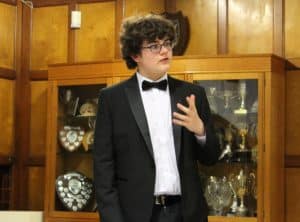 They should pursue things about which they are “truly passionate”, he said, before espousing the power and value of friendship: “…always remember your roots and who was with you on this journey when it all started.
They should pursue things about which they are “truly passionate”, he said, before espousing the power and value of friendship: “…always remember your roots and who was with you on this journey when it all started.
After leaving QE, Nikhil studied Geography and Management at Cambridge University where he was President of the India Society and captain of the Fitzwilliam College cricket team when they were twice winners of the Cuppers inter-collegiate competition. After university he took a gap year and now works as a Management Consultant for EY and an advisor to WOAW, a content marketing firm. He was accompanied by his partner, Aparna Joshi.
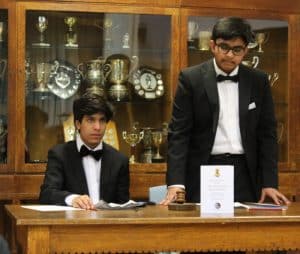 Nikhil finished his address with a toast to the Elizabethan Union. Current School Captain Bhiramah Rammanohar proposed a toast to ‘The Visitors’, while there were also the customary toasts to ‘Her Majesty, the Queen’ and to ‘The Pious Memory of Queen Elizabeth I’. Year 12 pupil Viraj Mehta chaired the debate.
Nikhil finished his address with a toast to the Elizabethan Union. Current School Captain Bhiramah Rammanohar proposed a toast to ‘The Visitors’, while there were also the customary toasts to ‘Her Majesty, the Queen’ and to ‘The Pious Memory of Queen Elizabeth I’. Year 12 pupil Viraj Mehta chaired the debate.
The guests enjoyed a dinner of spicy parsnip soup followed by confit of lamb (or pulled vegetables) and chocolate cake.

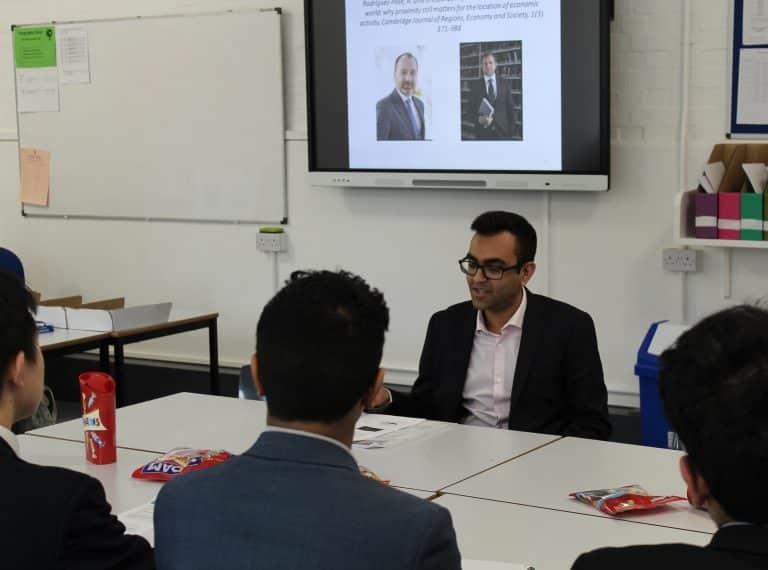
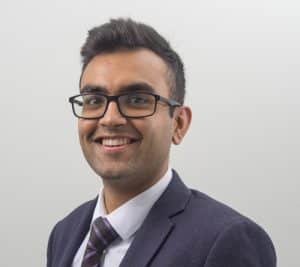 Hemang Hirani (OE 2008-15), who studied Geography and Economics at the London School of Economics and is now working for Barclays, gave a presentation to the select group of Year 12 geographers entitled The role of cities: an introduction to the field of Economic Geography.
Hemang Hirani (OE 2008-15), who studied Geography and Economics at the London School of Economics and is now working for Barclays, gave a presentation to the select group of Year 12 geographers entitled The role of cities: an introduction to the field of Economic Geography. coded maps of the USA and India depicting the importance of cities in both advanced and emerging economies.
coded maps of the USA and India depicting the importance of cities in both advanced and emerging economies.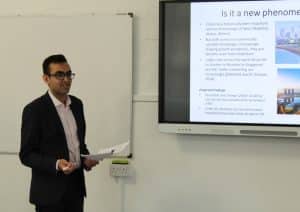 In his own time in the Sixth Form at QE, Hemang was a Senior Vice Captain. He has previously been involved in helping QE’s sixth-formers apply for Geography places at university.
In his own time in the Sixth Form at QE, Hemang was a Senior Vice Captain. He has previously been involved in helping QE’s sixth-formers apply for Geography places at university.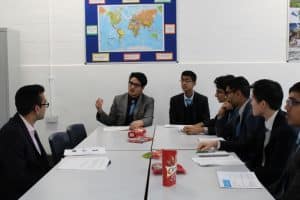 After graduating, he undertook a number of internships, including three months with Swiss investment bank and financial services company UBS as a Summer Analyst. He joined Barclays Private Bank in a similar role in June last year.
After graduating, he undertook a number of internships, including three months with Swiss investment bank and financial services company UBS as a Summer Analyst. He joined Barclays Private Bank in a similar role in June last year.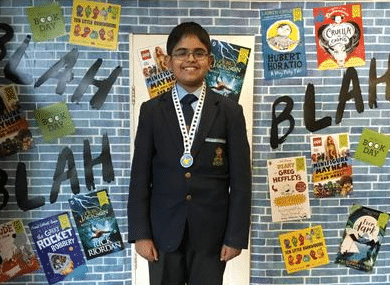
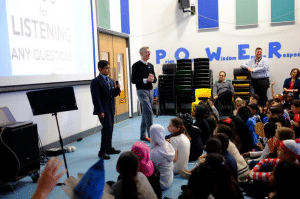 In an inspirational message, Rahul, who won the most recent series of the TV competition in 2017, told boys and girls at Edgware’s The Orion and Goldbeaters primary schools that academic success was “something to be proud of”, urging them to work towards it.
In an inspirational message, Rahul, who won the most recent series of the TV competition in 2017, told boys and girls at Edgware’s The Orion and Goldbeaters primary schools that academic success was “something to be proud of”, urging them to work towards it.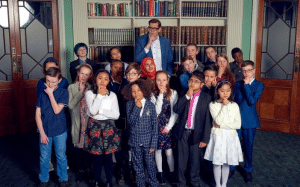 Mr Enright also said: “We are keen to further expand our outreach and partnership work with local schools, and I am delighted that Rahul served as a successful ambassador for both his own talents and the School on these visits.”
Mr Enright also said: “We are keen to further expand our outreach and partnership work with local schools, and I am delighted that Rahul served as a successful ambassador for both his own talents and the School on these visits.”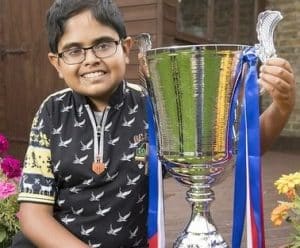 Having had his confidence boosted by his involvement with Child Genius, Rahul said he no longer finds speaking in public to be a daunting prospect, even to such large audiences. He said afterwards that he would be keen to deliver this message similarly in other schools.
Having had his confidence boosted by his involvement with Child Genius, Rahul said he no longer finds speaking in public to be a daunting prospect, even to such large audiences. He said afterwards that he would be keen to deliver this message similarly in other schools.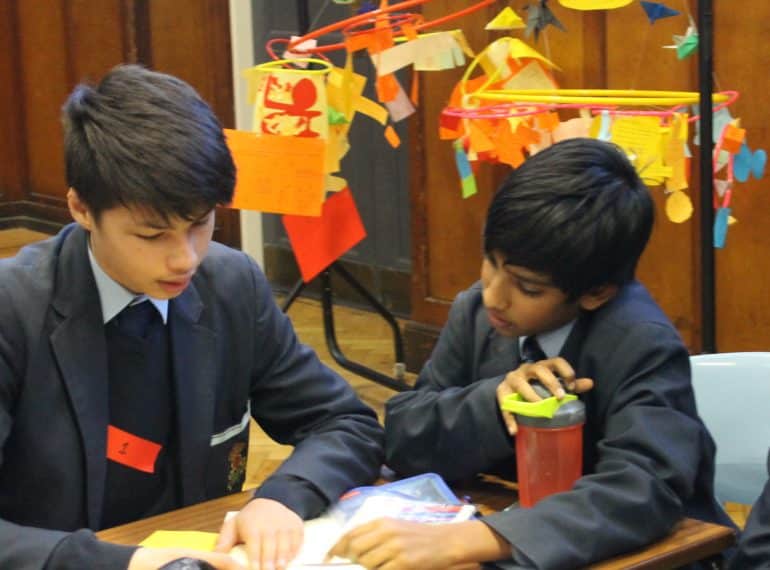
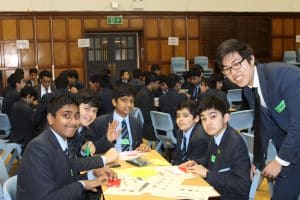 Each team was supervised by a Year 12 or 13 Further Mathematics A-level student, while sixth-formers also helped with the logistics of running the overall event.
Each team was supervised by a Year 12 or 13 Further Mathematics A-level student, while sixth-formers also helped with the logistics of running the overall event.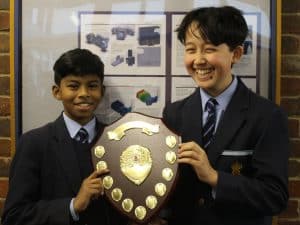 The overall winners of the Maths Circus were Pearce with 569 points, beating second-placed Harrisons’ by just one point. Third place went to Broughton, on 549. Pearce were later presented with their certificate and the Robinson-Leong Shield in assembly. The shield is named after Oliver Robinson (a 2018 leaver) and current Year 13 pupil Samuel Leong, who both donated prizes they had won through the Jack Petchey Foundation to the Mathematics department.
The overall winners of the Maths Circus were Pearce with 569 points, beating second-placed Harrisons’ by just one point. Third place went to Broughton, on 549. Pearce were later presented with their certificate and the Robinson-Leong Shield in assembly. The shield is named after Oliver Robinson (a 2018 leaver) and current Year 13 pupil Samuel Leong, who both donated prizes they had won through the Jack Petchey Foundation to the Mathematics department.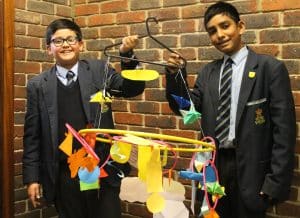 The prize for best mobile went to Leicester. This was also presented in assembly.
The prize for best mobile went to Leicester. This was also presented in assembly.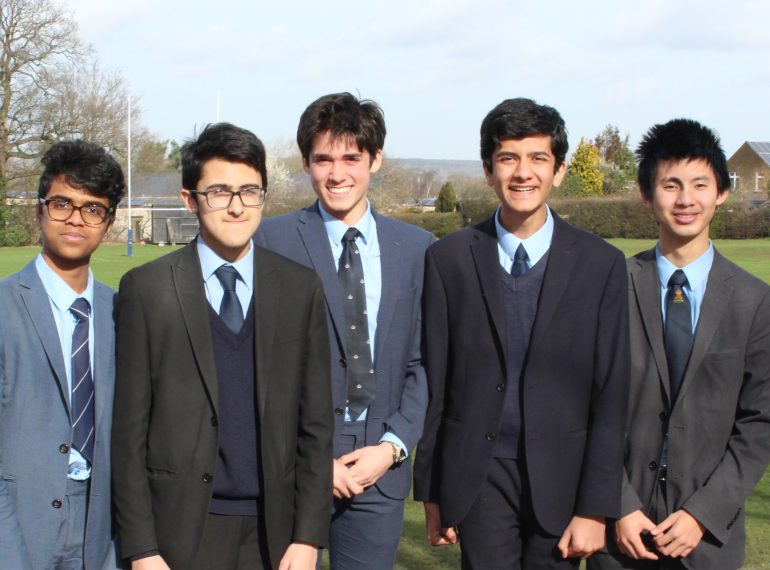
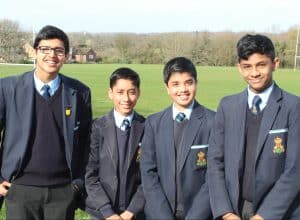 A further 143 QE boys have qualified for the challenge’s other follow-on round, the Intermediate European Kangaroo. With 140 qualifying last year and 133 in 2017, this reflects another rising trend. Nationally, a total of 5,500 pupils across all three year groups are invited to sit the Kangaroo test papers.
A further 143 QE boys have qualified for the challenge’s other follow-on round, the Intermediate European Kangaroo. With 140 qualifying last year and 133 in 2017, this reflects another rising trend. Nationally, a total of 5,500 pupils across all three year groups are invited to sit the Kangaroo test papers.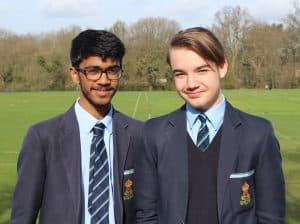 The Best in Year 10 accolade went to Dan Suciu, with 125, followed by Abhinav Santhiramohan, with 115. Best in Year 9 was Ansh Jassra, scoring 119 – “I like the blend of complex, challenging Maths and fun, creative problem-solving,” he said – and second place went to Arnie Sahi, on 116.
The Best in Year 10 accolade went to Dan Suciu, with 125, followed by Abhinav Santhiramohan, with 115. Best in Year 9 was Ansh Jassra, scoring 119 – “I like the blend of complex, challenging Maths and fun, creative problem-solving,” he said – and second place went to Arnie Sahi, on 116.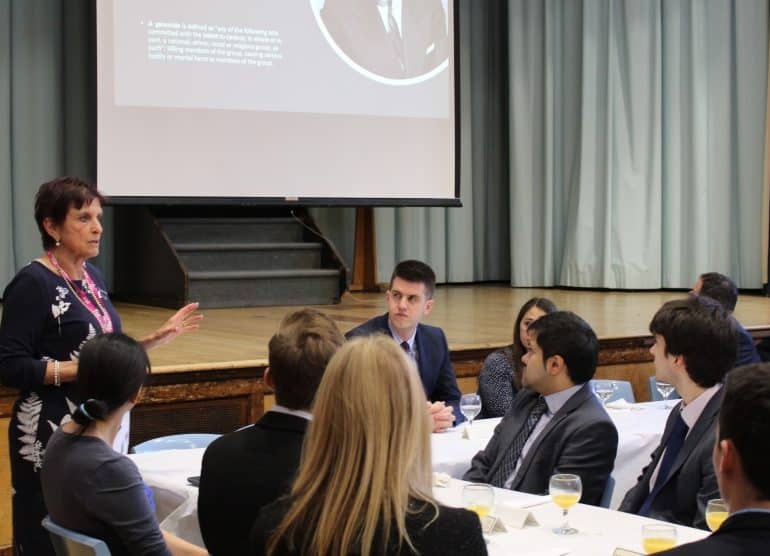
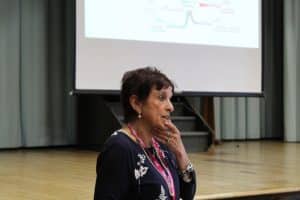 Dame Helen was the guest speaker at the annual meal, which is arranged to give sixth-formers experience of the sort of formal social occasions they will experience at university and in their careers beyond.
Dame Helen was the guest speaker at the annual meal, which is arranged to give sixth-formers experience of the sort of formal social occasions they will experience at university and in their careers beyond.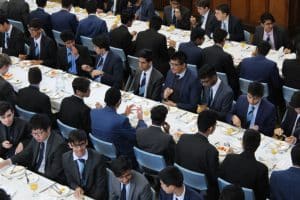 Headmaster Neil Enright said: “The boys and the teachers present greatly appreciated her thought-provoking contribution, which was perfectly pitched for the occasion. The boys always value the opportunity to hear from those eminent in their respective fields and to be able to put their questions to them.”
Headmaster Neil Enright said: “The boys and the teachers present greatly appreciated her thought-provoking contribution, which was perfectly pitched for the occasion. The boys always value the opportunity to hear from those eminent in their respective fields and to be able to put their questions to them.”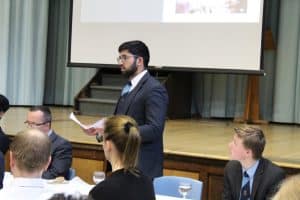
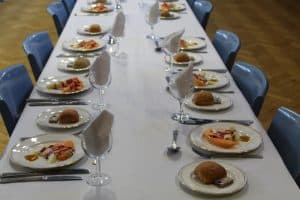 She spoke about the work of Refugees to Recovery (R to R), which she set up with Tony Rindl, Vicar of St Mary’s Church, Watford. R to R works with other organisations to collect items badly needed by refugees.
She spoke about the work of Refugees to Recovery (R to R), which she set up with Tony Rindl, Vicar of St Mary’s Church, Watford. R to R works with other organisations to collect items badly needed by refugees.